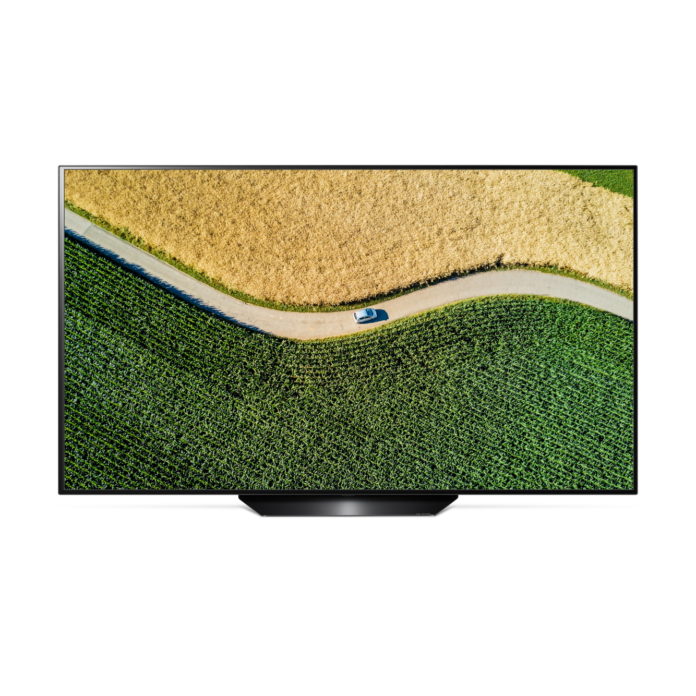LG Electronics is unveiling its premium 2019 TV lineups, including new OLED and NanoCell TV series featuring ThinQ AI technology at InnoFest MEA.
The event which takes place at LG Science Park in Seoul, South Korea from April 9 to 10, is LG’s annual celebration of innovation. The new TV models deliver upgraded AI picture and sound quality, underpinned by the company’s advanced second-generation Alpha, 9 Gen 2 intelligent processor and deep learning algorithm.
Thanks to the new algorithm, LG TVs offer optimized picture and sound by analyzing source content and by recognizing ambient conditions.
LG’s premium range for the MEA market is headlined by the flagship OLED TV lineup, which offers a variety of screen sizes: W9 (model 77/65W9), E9 (model 65E9), C9 (model 77/65/55C9) and B9 (model 65/55B9). [1]
NanoCell is LG’s new premier LED brand, the name highlighting the outstanding picture quality enabled by NanoCell technology. Ensuring a wider colour gamut and enhanced contrast, NanoColor employs a Full Array Local Dimming (FALD) backlight unit. NanoAccuracy guarantees precise colours and contrasts over a wide viewing angle while NanoBezel helps to create the ultimate immersive experiences via ultra-thin bezels and the sleek, minimalist design of the TV.
The NanoCell series comprises fourteen AI-enabled models, available in sizes varying from 49 to 77 inches (model 65SM95, 7565/55SM90, 65/55/49SM86 and 65/55/49SM81) [3].
The LG C9 OLED TV and the company’s 86-inch 4K NanoCell TV model (model 86SM90) were recently honoured with CES 2019 Innovation Awards. The exceptional 65-inch E9 and C9 OLED TVs also picked up accolades from Dealerscope, Reviewed.com, and Engadget.
The Alpha 9 Gen 2 intelligent processor used in LG’s W9, E9 and C9 series OLED TVs elevate picture and sound quality via a deep learning algorithm which leverages an extensive database of visual information, recognizing content source quality and implementing the best method for optimizing visual output.
Able to understand how the human eye perceives images in different lighting, the Alpha 9 Gen 2 intelligent processor finely adjusts the tone mapping curve in accordance with ambient conditions to achieve the optimal level of screen brightness.
The processor uses the TV’s ambient light sensor to measure external light, automatically changing brightness to compensate as required. With its advanced AI, the Alpha 9 Gen 2 intelligent processor can refine High Dynamic Range (HDR) content through altering brightness levels. In brightly lit settings, it can transform dark, shadow-filled scenes into easily discernible images, without sacrificing depth or making colours seem unnatural or over-saturated. LG’s 2019 TVs also leverage Dolby’s latest innovation, which intelligently adjusts Dolby Vision content to ensure an outstanding HDR experience, even in brightly lit conditions.
LG’s audio algorithm can up-mix two-channel stereo to convincingly replicate 5.1 surround sound. TheAlpha 9 Gen 2 intelligent processor fine-tunes output according to content type, making voices easier to hear in movies and TV shows, and delivering crisp, clear vocals in songs. LG TVs intelligently set the perfect levels based on their positioning within a room, while users can also adjust sound settings manually if they choose. LG’s flagship TVs again offer the realistic sound of Dolby Atmos for an immersive entertainment experience.
For further convenience, LG’s 2019 premium TV range comes with a new conversational voice recognition feature that makes it easier than ever to take control and ask a range of questions. The TVs can understand the context which allows for more complex requests, meaning users won’t have to make a series of repetitive commands to get the desired results. Conversational voice recognition will be available on LG TVs with ThinQ AI in over a hundred countries globally.
LG’s 2019 AI TVs support HDMI 2.1 specifications, allowing the new 4K OLED and NanoCell TV models to display 4K content at a remarkable 120 frames per second. Select 2019 models to offer 4K high frame rate (4K HFR), automatic low latency mode (ALLM), variable refresh rate (VRR) and enhanced audio return channel (eARC)




